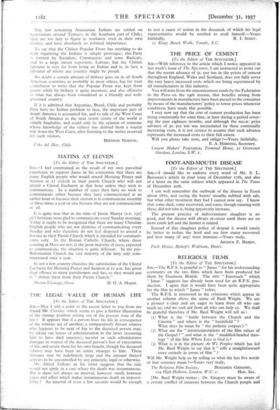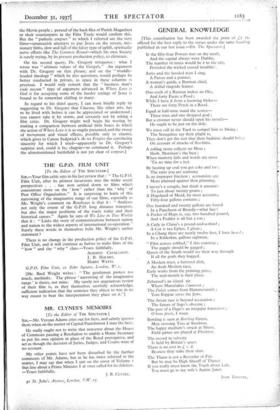RELIGIOUS FILMS
[To the Editor of THE SPECTATOR.] SIR,—The R.F.S. is grateful to " Janus " for his understanding comments on the two films which have been produced for them by Gaumont British. The title " Inasmuch " which " Janus " suggests has already been used for an R.F.S. pro- duction. I agree that it would have been quite appropriate for the film to which " Janus " refers.
The R.F.S. is interested in the criticisms which appear in another column above the name of Basil Wright. We are a pioneer s ciety and are eager to learn from all who can teach us, and we seek aid from all who can help us. We shall be grateful therefore if Mr. Basil Wright will tell us :
(I) What is the " battle between the Church and the Cinema " and where is the " battlefield "
What does he mean by " the pathetic corpses ? "
(2) What are the " misinterpretations of the film values of the Gospel ? " and what is the " muddled-headed theo- logy " of the film Where Love is God is ?
(3) What is it in the picture As We Forgive which has led Mr. Basil Wright to say that it " tells a straightforward story entirely in terms of film " ?
Will Mr. Wright help us by telling us what the last five words of that sentence mean ?—Yours very truly,
104 High Holborn, London, W.C. r. Hon. Sec.
[Mr. Basil Wright writes : Dr. Gregory must be aware of a certain conflict of interests between the Church people and the Movie people ; perusal of the back files of Parish Magazines or their counterparts in the Film Trade would confirm this. But the " pathetic corpses " to which I referred are the very films=—amateurish attempts to put Jesus on the screen, mis- sionary fihils, slow and full of the falser type of uplift, spiritually naïve efforts like The Common Round—which his own Society is.surely trying, by its present production policy, to eliminate.
On his second query, Dr. Gregory misquotes : what I wrote was " ultimate values of the Gospels." An argument with Dr. Gregory on that phrase, and on the " muddle- headed theology " which he also questions, would perhaps be better conducted in private, as space in these columns is precious. I would only remark that the " business man's ziade mecum " type of argument advanced in Where Love is God is for accepting some of the harder sayings of Jesus is bound to be somewhat chilling to many.
In regard to his third query, I can most briefly reply by suggesting to Dr. Gregory that Cinema, like other arts, has to be lived with before it can be appreciated or understood ; you cannot take it by storm, and certainly not by asking a film critic. Dr. Gregory might well begin his wooing by making a comparison between artificial little boxes in which the action of Where Love is is so stagily presented, and the sweep of movement and visual effects, possible only to cinema, which gives to Canon Sedgwick's As we Forgive the convincing sincerity for which I tried—apparently to Dr. Gregory's surprise and, could it be, chagrin—to commend it. Perhaps the aforementioned battlefield is not yet clear of corpses.]

































 Previous page
Previous page